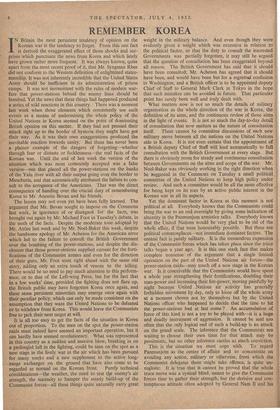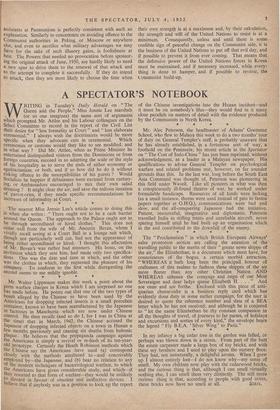1EMEMBER KOREA
IN Britain the most persistent tendency of opinion on the Korean war is the tendency to forget. From this one fact is derived the exaggerated effect of those shocks Elnd sur- prises which punctuate the news from Korea and which lately have grown rather more frequent. It was always known, quite apart from the most recent proof of it, that Mr. Syngman Rhee did not conform to the Western definition of enlightened states- manship. It was not inherently incredible that the United States Army should be inefficient in its administration of prison camps. It was not inconsistent with the rules of modern war- fare that power-stations behind the enemy lines should be bombed. Yet the news that these things had happened produced a series of wild reactions in this country. • There was a moment last week when those elements which consistently use such events as a means of undermining the whole policy of the United Nations in Korea seemed on the point of dominating British opinion on this matter. If they had not pressed their attack right up to the border of hysteria they might have got their way. As it was their own exaggerations produced the inevitable reaction towards sanity. But there has never been a plainer example of the dangers of forgetting—whether through fear or distaste or fecklessness—the real facts of the Korean war. Until the end of last week the version of the situation which was most commonly accepted was a false version—one that placed all the power-stations on the banks of the Yalu river with all their output going over the border to Manchuria, and that automatically attributed the failure to con- sult to the arrogance of the Americans. That was the direct consequence of handing over the crucial duty of remembering Korea to Mr. Aneurin Bevan and his friends.
The lesson may not even yet have been fully learned. The argument that Mr. Bevan sought to impose on the Commons last week, in ignorance of or disregard for the facts, was Itbrought out again by Mr. Michael Foot in Tuesday's debate, in he teeth of the facts. Despite the moderate tone adopted, by Mr. Attlee last week and by Mr.'Noel-Baker this week, despite the handsome apology of Mr. Acheson for the American error which led to the failure to consult the British Government over the bombing of the power-stations, and despite the dis- closure that those power-stations supplied current for the forti- tcations of the Cornmunist armies and even for the direction of their guns, Mr. Foot went right ahead with the same old story, adding only an extra touch of venom to the telling. There would be no need to pay much attention to this perform- ance, or to that of the Left-wing Press, but for the fact that in, a few weeks' time, provided the fighting does not flare up, the British public may have forgotten Korea once again, and these same persistent minorities may emerge once again with their peculiar policy, which can only be made consistent on the assumption that they want the United, Nations to be defeated or to withdraw from Korea. This would leave the Communists free to pick theirnext target at will.
It is all too easy to get the facts of the situation in Korea out of proportion. To the men on the spot the power-station raids must indeed have seemed an important operation, but it can hardly have seemed revolutionary. . What was represented in this country as a sudden and massive blow, breaking in on a prolonged lull in the fighting, could be seen on the spot as a new stage in the lively war in the air which has been pursued for many weeks and a new supplement to the active long- range exchanges on the ground that have also come to be regarded as normal on the Korean front. Purely technical_ considerations—the weather, the need to test tb,e enemy's air strength, the necessity to hamper the steady build-up of the Communist forces—all these things quite naturally carry great weight in the military balance. And even though they were evidently given a weight which was excessive in relation to the political factor, so that the duty to consult the interested Governments was partially forgotten, it may still be argued that the, question of consultation has been exaggerated beyond all reason. The British Government has said that it should have been consulted; Mr. Acheson has agreed that it should have been, and would have been but for a regretted confusion in Washington; and a British officer is to be appointed 'deputy Chief of Staff to General Mark Clark in Tokyo in the hope that such mistakes can be avoided in future. That particular point has surely been well and truly dealt with.
What matters now is not so much the details of milita organisation as the whole direction of the war in Korea, th definition of its aims, and the continuous review of those ai in the light of events. It is not so much the day-to-day det of consultation that now matters as the nature of consultatio itself. There cannot be committee discussions of each ne military move between all the nations on the United Nation side in Korea. It is not even certain that the appointment a British deputy Chief of Staff will lead automatically to f consultation with the British Government at every stage. But there is obviously room for steady and continuous consultation between Governments on the aims and scope of the war. Mr. Noel-Baker was obviously working in the right direction when he suggested in the Commons on Tuesday a small political committee of the United Nations to keep high policy under review. And such a committee would be all the more effective for being kept on its toes by an active public interest in the' Korean war in all its aspects.
Yet the dominant factor in Korea at this moment is not political at all. Everybody knows that the Communists could bring the war to an end overnight by giving some indication of sincerity in the Panmunjom armistice talks. Everybody knows that the United Nations would be 'very glad to be rid of the whole affair, if that were honourably possible. But these are political commonplaces—not immediate dominant factors. The central fact is purely military. It is the tremendous expansion of the Communist forces which has taken place since the truce talks began a year ago. It is this one stark fact that makes complete nonsense of the argument that a single limited operation on the part of the United Nations air forces—the power-station raids—may touch off a new stage in the Korean war. Is it conceivable that the Communists would have spent a whole year strengthening their fortifications, doubling their man-power and increasing their fire-power, moving painfully by night becauje United .Nations air activity has generally forbidden movement by day, only to lOose off the whole array at a moment chosen not by themselves but by the United Nations officer who happened to decide that the time to hit the power-stations had at last come ? An accumulation of force of this kind is not a toy to be played with—it is a huge and deadly instrument of aggression. It cannot be said too often that the only logical end of such a build-up is an attack on the grand scale. The inference that the Communists are waiting to choose their own time for that attack may be pessimistic, but no other inference carries as much conviction.
This is the situation we must cope with. To regard Panmunjom as the centre of affairs and to concentrate on avoiding any action, military or otherwise, froni which the Communist delegates there might take offence, is quite un- reahstic. It is true that it cannot be proved that the whole truce move was a cynical blind, meant to give the Communist forces time to gather their strength, but the derisive and con- temptuous attitude often adopted by General Nam II and his assistants at Panmunjom is perfectly consistent with such an explanation. Similarly to concentrate on avoiding offence to the Communist authorities in Peking or Moscow or anywhere else, and even to sacrifice what military advantages we may have for the sake of such illusory gains, is foolishness at best. The Powers that needed no provocation before sponsor- ing the original attack of June, 1950, are hardly likely to need a new spur to drive them to the renewal of that attack and to the attempt to complete it successfully. If they do intend to attack, then they are most likely to choose the time when their own strength is at a maximum and, by their calculation, the strength and will of the United Nations to resist is at a minimum. Consequently, unless and until there is some credible sign of peaceful change on the Communist side, it is the business of the United Nations to put off that evil day, and if possible to prevent it from ever coming. That means that the defensive power of the United Nations forces in Korea must be maintained, and if necessary increased, while every- thing is done to hamper, and if possible to reverse, the Communist build-up.



























































 Previous page
Previous page